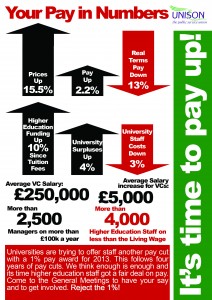The UNISON Higher Education Service Group Executive (HESGE) is urging members to strike for better pay, following the employers’ refusal to improve the 1% offer.
UNISON believes that the money is available for a better pay increase, and that Higher Education employers can afford to improve on their offer.
Over the last 5 years, as a result of pay rises below the cost of living, our lowest paid members have lost the equivalent income of between £663 – £1173. UNISON believes that no employees in higher education should be paid less than the national Living Wage and that it is time for incomes for everyone in the sector to match the rising costs of living.
According to a recent freedom of information request, the median pay of the highest paid members of staff in the higher education sector (including pension contributions and other pay related elements) was £242,000 with the highest paid employee receiving over £500,000 per year! There is money available for some – we believe it should be available for all.
UNISON believes that evidence from the employer’s shows that the financial position of the higher education is healthy and shows signs of expansion with the number of employees in the HE sector showing an increase for management, academic and support staff by over 4,000 between 1/8/11 and 1/8/12.
Although during the same period some universities have made redundancies, this is not reflected across all HEI’s and we believe that this is further evidence that the sector has the money to make an improved pay offer that fairly reflects the contribution of our members.
The HESGE believe that the only way for an improved pay offer from the employers is for members to take strike action, and show the University employers that enough is enough and that pay matters.
UNISON consulted members on whether the offer should be accepted, and the majority of those responding said they would not accept it. Therefore the HESGE has decided to ballot members for industrial action in September. If members vote for action, this would be likely to take place in the autumn.
Remember: your vote does count.
We will be arranging Branch meetings to allow members to discuss the pay offer and campaign for a better deal.
It is important that before the ballot we have accurate contact details for all members. In our branch we have done a lot of work over recent years to make sure that our records are up to date. However, we know that members are constantly on the move, and so if you have changed your name, phone number, email address or postal address, please make sure you have told us.
You can update your details by emailing Jo, our branch administrator.
Or call UNISONDirect on 0845 355 0845.
Or manage your details online here: http://www.unison.org.uk/my-unison/

